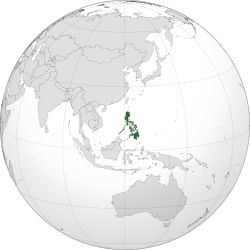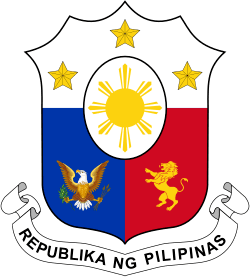LGBT culture in the Philippines
| LGBT rights in the Philippines | |
|---|---|
 | |
| Same-sex sexual activity legal? | Legal |
| Military service | Gays, lesbians and bisexuals allowed to serve openly since 2009 |
| Discrimination protections | None at the national level but many anti-discrimination ordinances exist at the local government level. |
| Family rights | |
| Recognition of relationships | None |
Restrictions: | The Family Code of the Philippines defines marriage as "a special contract of permanent union between a man and a woman". The Constitution of the Philippines does not prohibit same-sex marriage.[1] |
| Adoption | Allowed for individuals but not allowed for same-sex couples. |
Although lesbian, gay, bisexual and transgender (LGBT) people in the Philippines have a distinctive culture, their legal rights are limited. Gays and lesbians are generally tolerated (if not accepted) in Filipino society, but widespread discrimination remains. Filipino gays are known as bakla.
According to the 2002 Young Adult Fertility and Sexuality Survey, 11 percent of sexually-active Filipinos between the ages of 15 and 24 have had sex with someone of the same sex.[2] According to Filipino poet and critic Lilia Quindoza Santiago, Filipino culture may have a more flexible concept of gender; kasarian (Tagalog for "gender") is defined in less binary terms than the English word;[3] kasarian means "kind, species, or genus".[4]
Nomenclature
Bakla and bading are Tagalog words for a man who has feminine mannerisms, or dresses or identifies as a woman. Although the terms are not the equivalent of the English "gay",[5] the bakla are the most culturally-visible subset of gay men in the Philippines. They are often considered a third gender, embodying femininity (pagkababae) in a male body.[6][7] Although bakla is sometimes used in a derogatory sense, bakla people have largely embraced it.
The bakla are socially and economically integrated into Filipino society. A common stereotype is a parlorista, a cross-dresser who works in a salon.[8] Miss Gay Philippines is a bakla beauty pageant.
In the Philippines, the word "gay" is used to refer to any LGBT person. For Filipino gays the Tagalog phrase paglaladlad ng kapa ("unfurling the cape") or, more commonly, paglaladlad ("unfurling" or "unveiling") refers to the coming-out process. Some lesbians (butch and femme) use the words magic or shunggril to refer to themselves;[5] paminta describes masculine gay men. Neutral slang terms for gay men include "billy boy", badette and bading. Although many of these terms are considered derogatory, they are sometimes used casually or jokingly by the Filipino gay and lesbian community.
Rights
Although legislation supporting same-sex marriage in the Philippines has been proposed several times in the Philippine legislature, none has been passed.[9] The Philippine Commission on Elections (COMELEC) disqualified the Filipino LGBT political party Ladlad from fronting a candidate in the 2007 general election, concluding that the party did not have a nationwide membership.[10] COMELEC again refused Ladlad's petition to contest the 2010 elections on the grounds of "immorality".[11] However, on April 8, 2010, the Supreme Court of the Philippines overturned COMELEC's decision and allowed Ladlad to participate in the May 2010 elections.[12]
The Philippines has been ranked one of the most gay-friendly nations in the world and is the most gay-friendly in Asia. In a survey of 39 countries (only 17 of which had a majority accepting homosexuality), the Philippines were the 10th most gay-friendly.[13] The survey, "The Global Divide on Homosexuality" conducted by the US-based Pew Research Center, showed that 73 percent of adult Filipinos agreed that "homosexuality should be accepted by society" (up from 64 percent in 2002).[13]
Language
Swardspeak, or "gay lingo", is cant or argot derived from Taglish (Tagalog-English pidgin) and is used by the Filipino LGBT community.[14] It uses elements of Tagalog, English, Spanish and Japanese, celebrities' names and trademarked brands, giving them new meanings in different contexts.[15] Words derived from local languages or dialects, including Cebuano, Hiligaynon, Waray, Bicolano and other Philippine dialects, are also used by LGBT communities.
A Swardspeak speaker could be identified as homosexual, making it easier for people in the LGBT community to recognize each other. This created a group of speakers, helping the community resist cultural assimilation and marginalization. Straight people have begun to use Swardspeak, however, particularly in gay-dominated industries such as fashion and film.
Politics
In the Philippines there are no laws pertaining to same-sex marriage or unions, but at least one church cites freedom of religion in sanctioning what it calls holy unions.[16] Same-sex marriage is gaining some ground in Southeast Asia, with Democrat parliamentarian Wiratana Kalayasiri leading an initiative in Thailand. She drafted a legalisation bill which would make Thailand the first Asian country to do so. The Filipino Ang Ladlad party, whose founders, leaders and core constituency belong to the LGBT community, was recognized by the government and participated in party elections in 2013.[17]
Geraldine Roman is the first transgender person to be elected to the Philippine congress.[18] She has been a staunch advocate of an anti-discrimination bill.[19] Entertainers Aiza Seguerra and Arnell Ignacio are the first LGBT-community members appointed as government officials; they were appointed by President Rodrigo Duterte chair of the National Youth Commission and vice-chair of the Philippine Amusement and Gaming Corporation, respectively.
Advocacy
- Alpha Nu: Begun in 2014 and considered the Philippines' first openly-gay fraternity, Alpha Nu is recognized by the University of the Philippines-Diliman and advocates non-violent initiations, gender sensitivity and psychological support. It holds annual forums on HIV awareness.
- USeP Maharlika: The first LGBT student organization at the University of Southeastern Philippines, established in 2013
- PUP Kabaro: A gender-equality activist organization at the Polytechnic University of the Philippines
- UP Babaylan: Established in 1992, UP Babaylan is the first LGBT student organization in the Philippines and is the only LGBT support and advocacy student group at the University of the Philippines Diliman in Metro Manila.
- Doll House: A community group for open-minded individuals at Ateneo de Manila University
- ProGay: A gay-rights organization in Metro Manila
- Metropolitan Community Church: A network of LGBT-affirming churches in Quezon City, Metro Baguio, Makati and Marikina
- Can’t Live in the Closet: Lesbian activist group in Metro Manila
- Lesbian Advocates Philippines (LeAP): Metro Manila
- Lunduyan ng Sining (Sanctuary of Art): Registered lesbian art studio, providing a venue for lesbian art. The studio has produced a lesbian literary and art folio, What These Hands Can Do, and holds monthly music, film or art performances at Mag:net Katipunan in Quezon City
- IWAG: Social and support group in Davao City
- Northern Samar LGBT Community (NSLGBT): Northern Samar
- GAHUM: A gay support and advocacy group in Cebu City
- Rainbow Rights (R-Rights) Philippines (formerly the Rainbow Rights Project): Non-profit, non-partisan, non-governmental organization to create an environment which upholds human rights and equal opportunities for all, regardless of sexual orientation and gender identity or expression (SOGIE).
- Society of Transsexual Women of the Philippines (STRAP): Metro Manila
- PinoyFTM: Founded in July 2011 as the first organization for transsexual and transgender men in the Philippines. Based in Metro Manila, it has members throughout the Philippines.
- Order of St. Aelred: Spiritual gay center in Metro Manila
- AKOD: Gay support group at the Davao Oriental State College of Science and Technology
- Gorgeous and Young (GAY): Support group
- Philippine Forum on Sports, Culture, Sexuality and Human Rights (Team Pilipinas): A forum promoting human rights, sexual and gender diversity and equality through sports, culture and recreation
- UPLB Babaylan: LGBT organization and support group at the University of the Philippines Los Baños; promotes gender equality among the student body and beyond. Sponsors Pink Flicks (a film festival focusing on gender issues), symposiums, educational discussions and gatherings with other LGBT organizations.
- Metro Manila Pride: Umbrella organization for the annual Metro Manila Pride events[20]
- Quezon City Pride Council (QCPC): A pioneering initiative of the Quezon City government and the first of its kind in the country, it is a council to enforce LGBT rights and gender-based policies and programs. Created by Mayor Herbert Bautista with an office order, it was launched on 25 March 2013 to highlight the city government’s support for the implementation and enforcement of gender-based policies, programs and activities.
- Equality Philippines (EqualityPH): Non-profit organization to promote and safeguard the rights of LGBT members and allies in the Philippines
- True Colors Coalition (TCC): Political LGBT organization to continue the community's struggle for equality, acceptance and freedom by organizing, educating and mobilizing the community and its allies and campaigning to end all forms of discrimination. TCC is a member of Kilusan para sa Pambansang Demokrasya (KILUSAN).
References
- ↑ "CBCP exec: US should respect PHL law regarding same-sex marriage | Pinoy Abroad | GMA News Online". gmanetwork.com. Retrieved 2014-04-06.
- ↑ "Survey shows young Filipinos are opening up homosexual activities" (PDF). 23 July 2003. Archived from the original (PDF) on 1 April 2005. Retrieved 5 December 2009.
- ↑ Garcia, J. Nelia C. (2000). "Performativity, the bakla and the orienting gaze". Inter-Asia Cultural Studies. 1 (2): 265–281. doi:10.1080/14649370050141140.
- ↑ "Kasarian." Tagalog-English Dictionary. 2nd. ed. 1986.
- 1 2 Garcia, J. Neil C. (2008). Philippine gay culture: binabae to bakla, silahis to MSM. University of the Philippines Press. ISBN 978-971-542-577-3.
- ↑ Aggleton, Peter (1999). Men who sell sex: international perspectives on male prostitution and HIV/AIDS. Temple University Press. p. 246. ISBN 1-56639-669-7. Retrieved 5 June 2010.
- ↑ Casabal, Norberto V (2008). "Gay Language: Defying the Structural Limits of English Language in the Philippines". Kritika Kultura (11): 89–120. doi:10.3860/kk.v0i11.754. Retrieved 27 January 2011.
- ↑ Benedicto, Bobby (2008). "The Haunting of Gay Manila: Global Space-Time and the specter of Kabaklaan". GLQ: A Journal of Lesbian and Gay Studies. 14 (2-3): 317–338. doi:10.1215/10642684-2007-035.
- ↑ LeiLani Dowell (17 February 2005). "New Peoples Army recognizes same-sex marriage". Workers World Party. Retrieved 17 November 2008.
- ↑ Aning, Jerome (1 March 2007). "Gay party-list group Ladlad out of the race". Philippine Daily Inquirer. Retrieved 18 January 2010.
- ↑ "CHR backs Ang Ladlad in Comelec row". ABS-CBN News. 15 November 2009. Retrieved 10 December 2009.
- ↑ "SC allows Ang Ladlad to join May poll". ABS-CBN News. 8 April 2010. Retrieved 18 May 2011.
- 1 2 Tubeza, Philip C (8 June 2013). "PH ranks among most gay-friendly in the world". Inquirer.net. Retrieved 20 July 2017.
- ↑ Empress Maruja (27 July 2007). "Deciphering Filipino Gay Lingo". United SEA. Retrieved 23 December 2010.
- ↑ Jessica Salao (30 April 2010). "Gayspeak: Not for gays only". The Philippine Online Chronicles. Retrieved 23 December 2010.
- ↑ "Holy Unions". Metropolitan Community Church Philippines. Archived from the original on 30 June 2015. Retrieved 21 July 2017.
- ↑ Mark Gevisser (12 May 2013). "Ang Ladlad party brings beauty parlours and gay pageants out to vote in Philippines". The Guardian. Retrieved 21 July 2017.
- ↑ Heather Chen (10 May 2016). "Geraldine Roman: First transgender politician elected in the Philippines". BBC News. Retrieved 21 July 2017.
- ↑ Anna Bueno (17 October 2016). "5 things you should know about the Anti-Discrimination Bill". Archived from the original on 4 April 2017. Retrieved 21 July 2017.
- ↑ "About the Organizer". Metro Manila Pride. Retrieved 21 July 2017.
External links
- Barangay Los Angeles - Filipino LGBT organization in Los Angeles.
| Wikimedia Commons has media related to LGBT in the Philippines. |
- Outrage Magazine - publication for the gay, lesbian, bisexual, transgender, queer, intersex and ally (GLBTQIA) communities in the Philippines.
